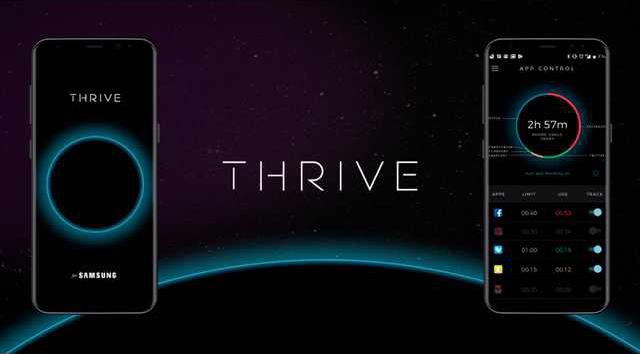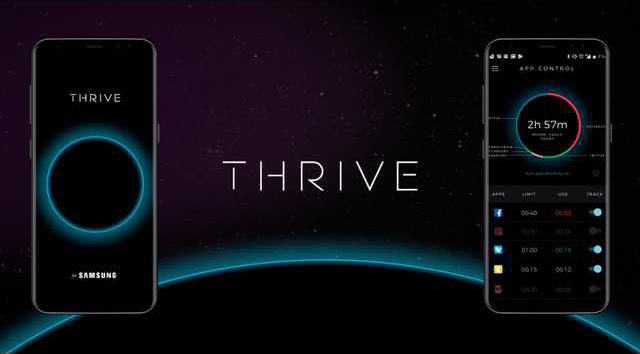A new app can help you curb your smartphone addiction.
The new app Thrive, which recently became available for free on Samsung devices, works as a sort of detox against smartphone addiction, according to The Washington Post.
Former Huffington Post editor-in-chief Arianna Huffington and Samsung partnered together to create the app.
You really cant talk seriously about overall well-being without talking about how we use technology, Huffington told Inverse. Obviously it allows us to do amazing things, but its also sped up the pace of lives beyond our capacity to keep up. We all feel it were being controlled by something we should be controlling.
When you receive a text, the app will send a reply saying that youre busy using the Thrive app.
If smartphones are the new cigarettes, Thrive is a new kind of nicotine patch, according to The Washington Post. The app wont cure everything thats screwed up about our relationship with phones Thrive is an add-on to the software that runs the phone, and it only begins to address the social illness that compels us to be always connected. But its something you can actually do to break the spell of these glowing rectangles.
Huffington, of course, recognizes that theres an irony here using an app to shut down smartphone addiction.
Going to sleep with the lights off doesnt make us anti-electricity, she said. In the same way, turning off our phones to be able to reconnect with the people and things we most value doesnt make us anti-technology.
Features for the app include Thrive Mode, which will block all apps, notifications, calls and texts something like an airplane mode.
But, unlike airplane mode, you can add people to a VIP list, allowing those peoples message to get through to you, according to Venturebeat.
Users can also add default replies and app blocking, which will allow you to define which apps you can use while "Thriving." You can also designate what time those apps will become available again.
Huffington said she delayed the apps release to the new year when people are still looking at new years resolutions and the positive changes they want to bring about in their lives."
Cutting back on smartphone use time doesnt always require an app. According to the Deseret News, other phones exist that only allow for texting and calling.
One example is the Light phone, which costs $150 and doesnt feature a screen, apps, texting or internet browser.
Though the debate continues about how often people use smartphones, experts encourage Americans to interact and converse more with their families, friends and colleagues.
"What is most important is that families and individuals and businesses carve out sacred spaces; the car, the kitchen, the dining room," Sherry Turkle, a professor of the social studies of science and technology at the Massachusetts Institute of Technology, wrote in an e-mail to the Deseret News. "Habits are formed by creating places where we know that we reserve ourselves for conversation."
The new app Thrive, which recently became available for free on Samsung devices, works as a sort of detox against smartphone addiction, according to The Washington Post.
Former Huffington Post editor-in-chief Arianna Huffington and Samsung partnered together to create the app.
You really cant talk seriously about overall well-being without talking about how we use technology, Huffington told Inverse. Obviously it allows us to do amazing things, but its also sped up the pace of lives beyond our capacity to keep up. We all feel it were being controlled by something we should be controlling.
When you receive a text, the app will send a reply saying that youre busy using the Thrive app.
If smartphones are the new cigarettes, Thrive is a new kind of nicotine patch, according to The Washington Post. The app wont cure everything thats screwed up about our relationship with phones Thrive is an add-on to the software that runs the phone, and it only begins to address the social illness that compels us to be always connected. But its something you can actually do to break the spell of these glowing rectangles.
Huffington, of course, recognizes that theres an irony here using an app to shut down smartphone addiction.
Going to sleep with the lights off doesnt make us anti-electricity, she said. In the same way, turning off our phones to be able to reconnect with the people and things we most value doesnt make us anti-technology.
Features for the app include Thrive Mode, which will block all apps, notifications, calls and texts something like an airplane mode.
But, unlike airplane mode, you can add people to a VIP list, allowing those peoples message to get through to you, according to Venturebeat.
Users can also add default replies and app blocking, which will allow you to define which apps you can use while "Thriving." You can also designate what time those apps will become available again.
Huffington said she delayed the apps release to the new year when people are still looking at new years resolutions and the positive changes they want to bring about in their lives."
Cutting back on smartphone use time doesnt always require an app. According to the Deseret News, other phones exist that only allow for texting and calling.
One example is the Light phone, which costs $150 and doesnt feature a screen, apps, texting or internet browser.
Though the debate continues about how often people use smartphones, experts encourage Americans to interact and converse more with their families, friends and colleagues.
"What is most important is that families and individuals and businesses carve out sacred spaces; the car, the kitchen, the dining room," Sherry Turkle, a professor of the social studies of science and technology at the Massachusetts Institute of Technology, wrote in an e-mail to the Deseret News. "Habits are formed by creating places where we know that we reserve ourselves for conversation."








